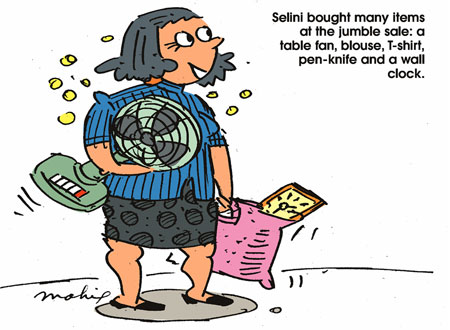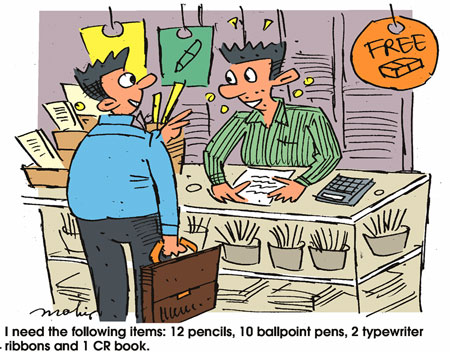|

by R. S. Karunaratne
Punctuation marks
[Part 2]
Colon ( : )
We use a colon to introduce a list of items that add to what was said
in the first part of the sentence.
Selini bought many items at the jumble sale: a table fan, blouse,
T-shirt, pen-knife and a wall clock.
We use a colon to introduce explanations and amplifications. Amanda’s
essay was very poor: the spelling and handwriting were childish.
I have news for you: You’ve passed the examination.

We use a colon to introduce lists, series and quotations.
I need the following items: 12 pencils, 10 ballpoint pens, 2
typewriter ribbons and 1 CR book.
Alexander Pope put it nicely: “To err is human, to forgive divine.”
We use a colon in memos and reports:
To:
From:
Reference:
Subject:
Date:
We use a colon in citing passages from the Bible.
Job 24 : 7
Corinthians 6 : 8
A characteristic use of the colon is found in the scripts for plays.
James: Rani, what are we going to do now?
Rani: We’ll wait here for some time.
We use a colon in ratios.
In some countries women outnumber men in the ratio 3 : 2.
Brackets and Parentheses ( )
Brackets always appear in pairs. There are basically three types of
brackets.
Round brackets ( )
Square brackets [ ]
Brace brackets { }
For normal purposes of punctuation we use round brackets. In American
English brackets are known as “Parentheses.”
Round brackets ( )
We use round brackets to enclose supplementary information which can
be removed without changing the overall meaning of a sentence.
R. L. Stevenson (1850-1894) is a well-known author.
We use round brackets to mark off abbreviations.
The syllabus is designed by the National Institute of Education (NIE).
Square brackets [ ]
We use square brackets to indicate editorial content.
Carlyle’s grandson (Stephen Forbes [1956-2000]) completed the murals.

Brace brackets { }
Brace brackets, also known as “Curly brackets”, are normally used in
mathematics and tabular material.
Dash ( - )
We use a dash to indicate a break in the continuity of a sentence,
often informally. In formal writing it is better to avoid using a dash.
Instead we can use commas and brackets.
Hello, it’s me - Twinkle Khanna.
Sometimes, we use a dash to break the continuity of a sentence.
Fancy meeting you here - I thought you were in Canada.
We use a dash to introduce an afterthought.
I am from Sri Lanka - where the world’s best tea is produced.
We use a dash to introduce a summary statement.
Meet Mudliar Dissanayake - one of those colonial remnants who is
still living in an ancient walauwa.
Sometimes, we use the dash in broken sentences for emphasis.
There are nine and sixty ways of constructing tribal laws. And every
- single - one - of - them - is - right.
- Rudyard Kipling
We use the dash for balance or amplification.
The most powerful weapon against ignorance - the diffusion of printed
material. - Leo Tolstoy
We use the dash to indicate incompleteness.
He had a close relationship with Miss M - .
We use the dash to replace the word “to.”
Norma lived from 1942-1972.
We use the dash to indicate breaks in speech.
I - er - I - don’t know who you are.
To be continued
English proverbs explained
A proverb is a popular short saying, with words of advice or warning.
Generally, most of the proverbs contain the concentrated folk wisdom.
1. Don’t outrun the constable
The proverb has nothing to do with police constables. It simply means
that you should not get into debt.
2. Don’t pour out the dirty water before you have cleaned.
Water is precious and it has to be used carefully and sparingly. By
extension, the proverb means that you should not throw away anything
until a replacement is made.
3. Don’t put all your eggs in one basket
This is good advice for travellers. They should not keep valuables
and money in one place. Keep them in different places.
4. Don’t put new wine into old bottles
Jesus Christ asked, “Can friends at a wedding mourn, so long as the
bridegroom is beside them?” Then he said that a piece of new cloth
should not be sewn on an old coat, because it will shrink and make the
tear worse. In simple words, we should not try to bring together things
that are out of keeping with each other.
5. Don’t put the cart before the horse
We should deal with people and things in their right order.
6. Don’t quarrel with your bread and butter
Do not give up your job without sufficient reasons.
7. Don’t ride the high horse
You should not be arrogant.
8. Don’t speak to the man at the wheel
We should not speak to the driver of a vehicle because it will
distract his attention. By extension, we should not interfere with a
person who is responsible for the safety of others.
9. Don’t take your harp to the party
We should not talk about the same subject.
10. Don’t teach your grandmother to suck eggs
We should not offer advice to people who are more experienced than we
are.
Starters:
Use of ‘like’ and ‘hate’
The word “like” means to enjoy or approve of something or somebody.
I like Doreen.
Dan likes her new hairstyle.
Do you like classical music?
I don’t like upsetting people.
Children like sports.
We use “would like’ to mean “want.”

I would like to be an actor.
Would you like to have some soup?
I would like to visit Rangoon.
I would like to say a big thank you.
Note: “Would like” is always followed by the preposition “to.”
There are other words that mean “like.”
Herat adores classical music.
Mayuri loves cats and dogs.
The expression “fond of” also means “like.”
The teacher is fond of the new student.
Father is fond of his granddaughter.
“Like” also means “similar to.”
He is very much like his father.
I’ve got a laptop just like this.
Common mistake
Don’t say: How is life like in Russia?
Say: What is life like in Russia?
“Like” can be used as a suffix.
I didn’t like his animal-like behaviour.
This is a cabbage-like vegetable.
“Liking” is the noun.
He has developed a liking for music.
Is the house to your liking?
We do not use “the” for general ideas.
Do you like mathematics?
We don’t like meat.
Hate
“Hate” is the opposite of “like.”
When we do not like somebody or something we use “hate”.
Sharon hates her new boss.
We hated the dark days of winter.
I hate when you get late.
She hated speaking in public.
There are other ways of saying “hate”.
We detest any kind of cruelty to animals.
A: Do you like beef?
B: No, I loathe it.
Sarala despised him for the way he treated her.
Father abhors liquor.
We deplore child abuse in any form.
Sometimes we receive hate mail from people who do not like us.
“-hater” is used as a suffix.
Everybody thinks that he is a woman-hater.
“Hatred” is a noun that means “strong dislike”
Racial hatred sometimes leads to violence.
Quiz on prefixes
Most of the prefixes used in English have a Latin or Greek origin.
Underline the prefixes in the following words. The meaning of the prefix
is given against each word. Check your answers with the key.
1. abduct: away, from, off
2. adjoining: to, towards
3. ambidextrous: both
4. antenatal: before
5. autobiography: self
6. benevolent: well
7. bicycle: two
8. biology: life
9. circumference: around
10.cooperate:together with
11. compete: with
12. descend: down
13. demigod: half
14. diameter: across
15. emplane: in
16. equilateral: equal
17. exit: out
18. ex-president: former
19.extraordinary: beyond
20. foretell: before
21. hemisphere: half
22. homophones: similar
23.hyper-sensitive: above
24. invade: in
25.interrupt:among, between
1. ab, 2. ad, 3. ambi, 4. ante, 5. auto, 6. bene, 7. bi, 8. bio, 9.
circum, 10. co, 11. com, 12. de, 13. demi, 14. dia, 15. em, 16. equi,
17. ex, 18. ex, 19. extra, 20. fore, 21. hemi, 22. homo, 23. hyper, 24.
in, 25. inter 2.
Irregular verbs
Here is a list of irregular verbs with their present and past tense
forms. Write the past participle on the dotted line and check your
answers with the key.
1. arise / arose / ...........................
2. be / was / .................................
3. bear / bore / .............................
4. beat / beat / .............................
5. become / became / ..................
6. begin / began / ........................
7. bite / bit / ................................
8. blow / blew / ...........................
9. break / broke / ........................
10. choose / chose / ...................
11. come / came / .......................
12. do / did / ..............................
13. draw / drew / ........................
14. drink / drank / ......................
15. drive / drove / ......................
16. eat / ate / ............................
17. fall / fell / .............................
18. fly / flew / ............................
19. give / gave / ........................
20. go / went / ..........................
21. grow / grew / .......................
22. hide / hid / ..........................
23. know / knew / .....................
24. ring / rang / ........................
25. rise / rose / ........................
26. run / ran / ..........................
27. see / saw / .........................
28. show / showed / .................
29. sing / sang / .......................
30. sink / sank / ......................
31. speak / spoke / ..................
32. steal / stole / .....................
33. swim / swam / ...................
34. take / took / ........................
35. tear / tore / ........................
36. throw / threw / ...................
37. wake / woke / ...................
38. write / wrote / ....................
Key:
1. arisen, 2. been, 3. born / borne, 4. beaten, 5. become, 6. begun,
7. bitten, 8. blown, 9. broken, 10. chosen, 11. come, 12. done, 13.
drawn, 14. drunk, 15. driven, 16. eaten, 17. fallen, 18. flown, 19.
given, 20. gone, 21. grown, 22. hidden, 23. known, 24. rung, 25. risen,
26. run, 27. seen, 28. shown, 29. sung, 30. sunk, 31. spoken, 32.
stolen, 33. swum, 34. taken, 35. torn, 36. thrown, 37. woken, 38.written |

